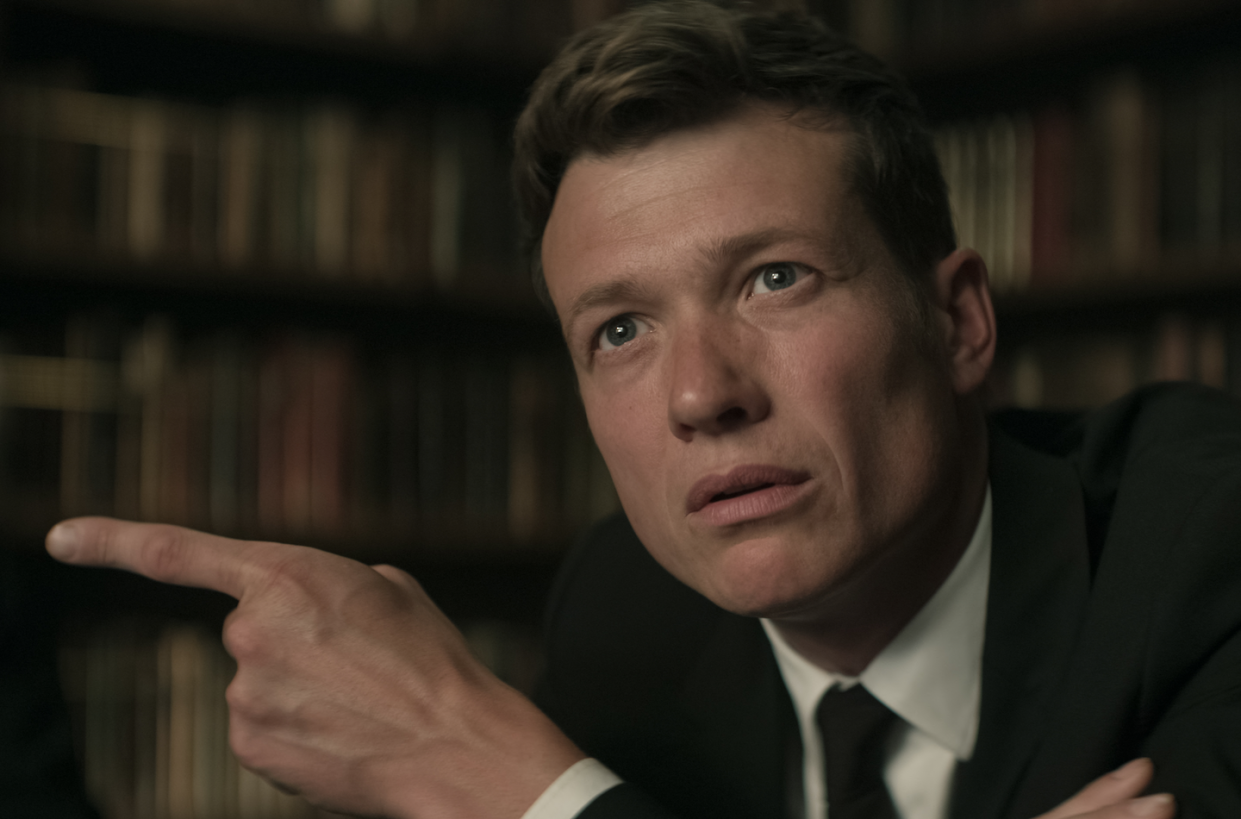The 'You' Season 4 Finale Proves That Therapy-Speak Has Lost All Meaning

From the very beginning of Netflix’s You, there have been two Joe Goldbergs. There is the Joe we hear about in Joe’s own thoughts: the sensitive, overly protective person whose only crime is caring too much. Then there’s the Joe we see in action: the stalker and murderer, the guy who masturbates into bushes and disposes of bodies in increasingly creative ways.
In season 4, Joe’s fragile sanity has finally collapsed under the weight of holding these two selves and fractured into two people instead of one: there’s Joe (Penn Badgley), and then there’s Rhys Montrose (Ed Speelers). “Rhys” is based on a real person but is a figment of Joe's imagination that he's been conversing with all season, and he represents all of Joe’s violence and wrongdoing. Rhys is a Tyler Durden-esque alter ego who is described as “all Joe's worst bits in a little package you don’t mind having a pint with.” Rhys is Joe Goldberg unleashed, all his derision for the world’s hypocrites and desire to make people suffer, neatly severed from Joe himself.
Rhys is also, we learn, an absolute master of therapy-speak.
Therapy-speak, for those blessed enough not to be familiar with the term, is the deployment of words like “boundaries” and “holding space” and “triggered” in everyday, non-therapeutic scenarios—increasingly, in the interest of absolving whoever’s using those words from anything like guilt or blame. The term most recently gathered steam in response to a viral TikTok video on “how to break up with a friend,” which suggested sitting that soon-to-be-alienated party down and telling them that, while you’ve “treasured our season of friendship,” you “don’t have the capacity to invest in [their] friendship any longer.” Viewers dragged the video to hell and back, baffled by the corporate, “grandiose” language and generally agreeing it was worse than being ghosted.
“If someone said this to me I’d never recover,” one popular comment read. Another pointed out: “Who would wanna be around someone who talks like that?”
Of course, terms like “trauma” and “triggered” still have value in therapeutic settings, when used by actual therapists with patients working through mental health issues. I'm not trying to drag people who use these terms in the way in which they were originally intended. And if watching a therapy-speak video on TikTok gives someone the tools to express something they haven't been able to express before, that's great. But their colloquial use, on TikTok and beyond, has turned many of them into catch-all phrases that barely even invoke the concepts from which they came.
You, always happy to poke fun at the latest TikTok trend, found the perfect way to play with our increasingly therapy-tinged language: by having Rhys use that same therapy-speak to suggest that Joe’s serial killing isn’t really his fault, and in fact, isn’t really a problem at all. If you've been paying attention to this trend, you probably laughed out loud hearing how Rhys tries to excuse Joe’s own behavior to himself time and time again.
“You need to embrace your truth, Joe,” Rhys says. “All you ever wanted is to be seen, to be loved.”

“You are a stellar example of the human condition,” he adds in the finale, pulling on some more favorite therapy-words of 2022 to make his point: “A traumatized brain constantly trying to shame us. That’s what you need to fight, the shame.” It’s classic TikTok-ified therapy-speak: Joe’s not doing anything wrong, he just needs to reframe his thinking! Joe’s not a killer — he’s just working through childhood trauma.
You is hoping that, once you hear it in this context, you’ll see how weird these excuses sound when they've been twisted for convenience—what it also points out is, now that we’re all so used to hearing therapy-speak in every aspect of our lives, how little meaning these words have left. Hearing Rhys give these therapy-inspired excuses for Joe’s behavior leaves us wondering how and if these words will ever regain their true meaning.
Soon after revealing his true identity, Rhys tells Joe that “of course” he’s not “some cold-blooded psycho,” it’s “much more complex than that.” Over the past few years, the world has jumped at the idea that all of our reactions, no matter how petty or selfish, are much “more complex” than they appear, and the vocabulary of therapy has been used to explain, in detail, how. And in some cases that's true, and our reactions to things are deeply layered. But, in life as in You, some things aren’t complex at all. You don’t want to be friends with your friend anymore; Joe is a stalker and killer. Those aren't the same, obviously, but you get my point. Outside of a therapist’s office, telling your friend that you’ve been “reevaluating many areas of [your] life lately” is as useless and besides the point as Rhys telling Joe he’s just trying “to be seen.”
If we could stick with using therapy-speak for therapy-related issues, then maybe it could start to mean something real again. But as long as people are still describing themselves as “triggered” by a trip to the grocery store or “traumatized” by a bad commute, these words will keep right on meaning nothing at all.
You Might Also Like
